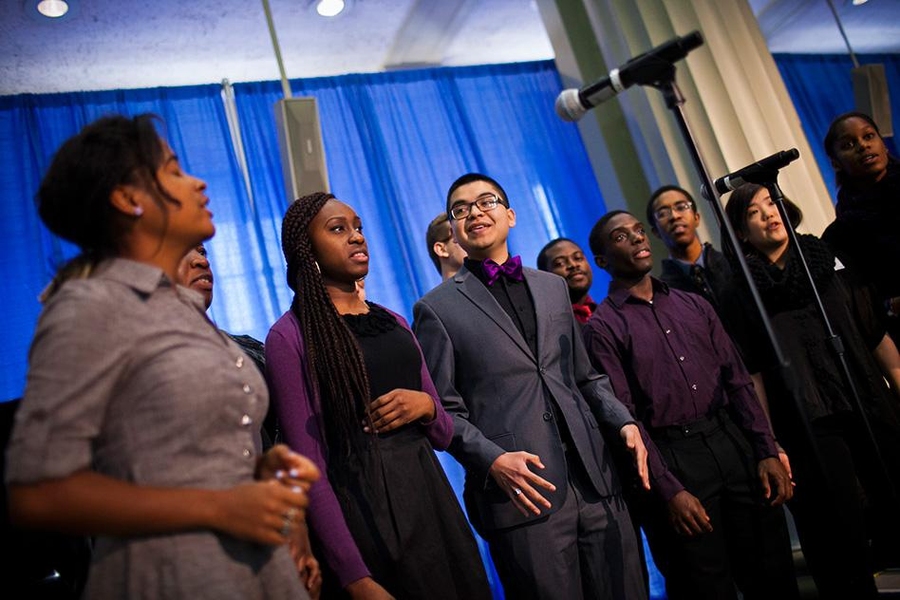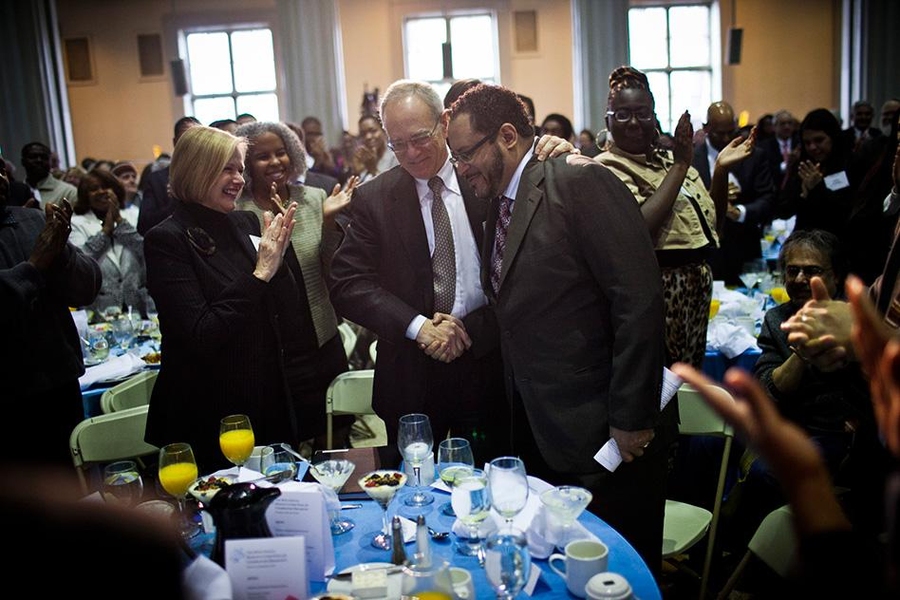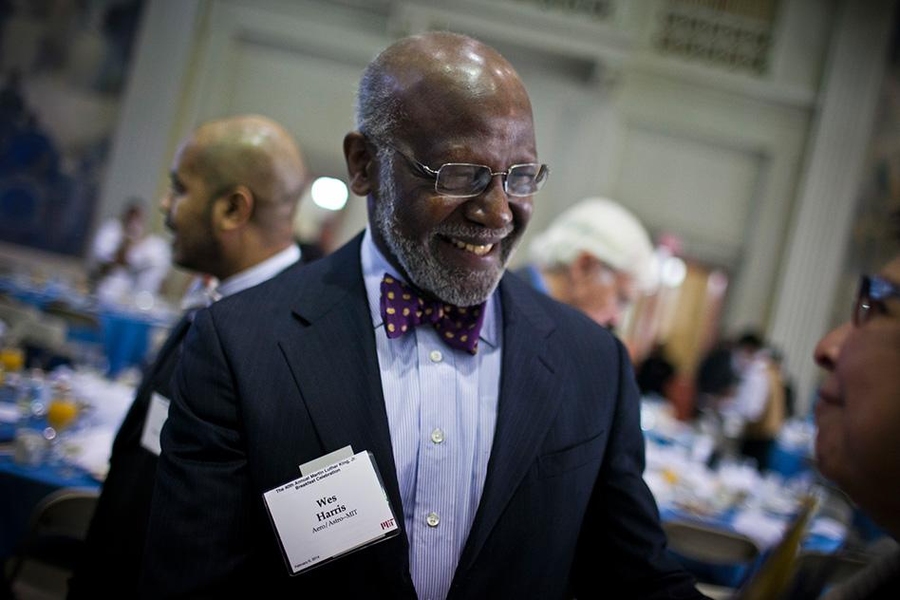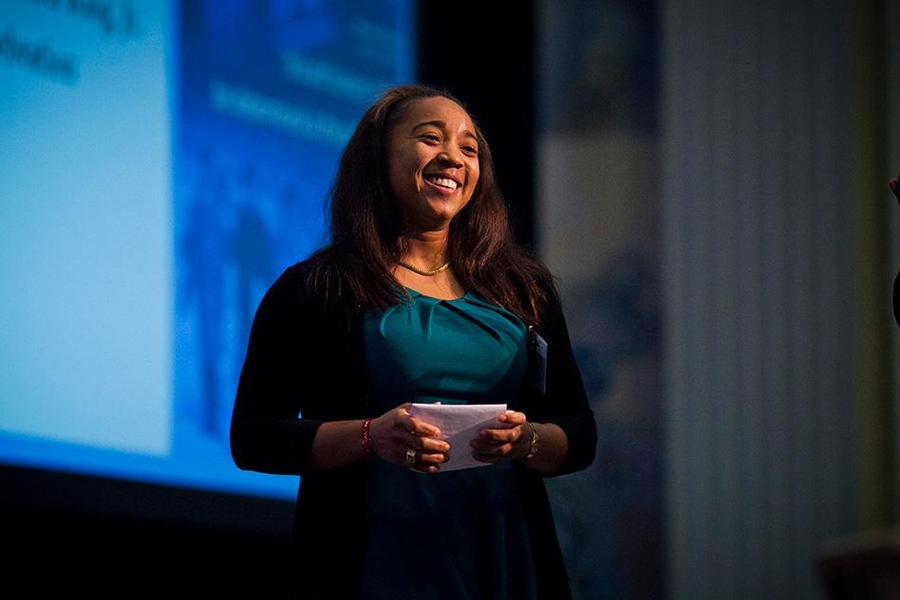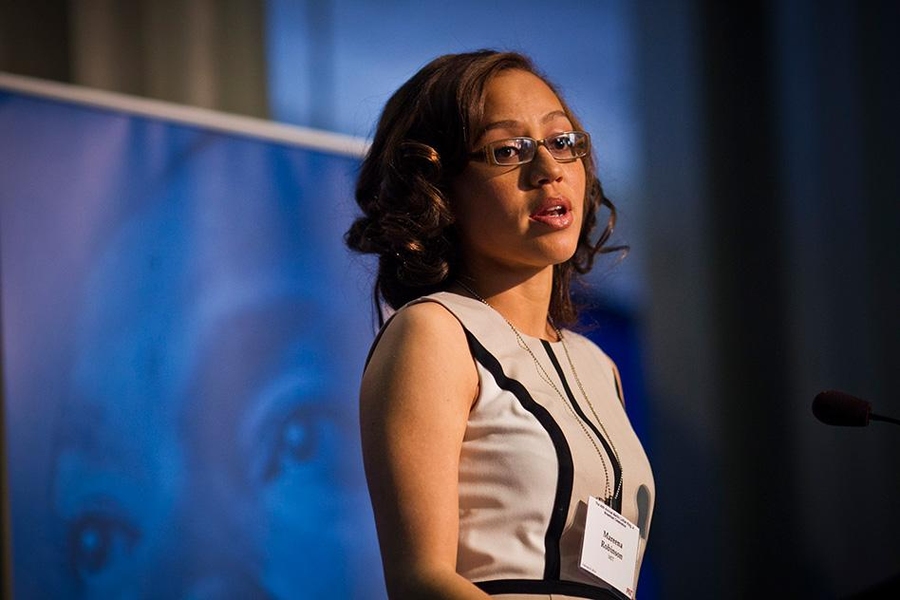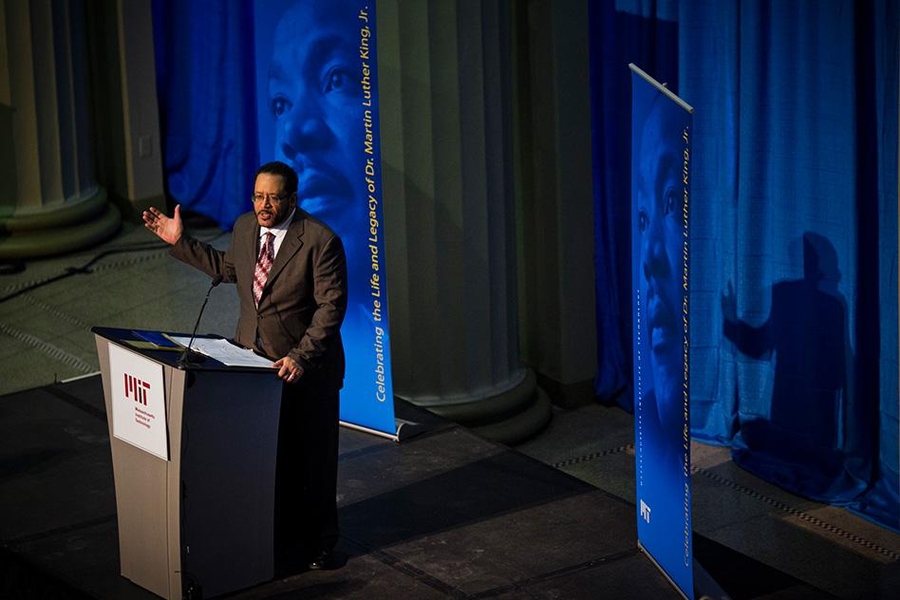As the MIT community gathered for the 40th annual breakfast celebration of the life and legacy of Martin Luther King Jr., speakers reflected on how much the nation has progressed toward his dream of inclusiveness over those decades — as well as on the need to keep working toward that vision, despite the fact that signs of racism in society have become less obvious.
Graduate student Mareena Robinson, who is pursuing a doctorate in nuclear science and engineering, spoke on King’s leadership during the early days of the civil rights movement. “Unlike race relations today, where prejudice and discrimination is subtle and often denied by the ones who perpetrate it, the discrimination of that time was undeniable, inescapable, and not to be apologized for,” she said.
Robinson added, “It is true and must be acknowledged that much progress has been made … with the election and re-election of our first African-American president, who stands as a symbol of America’s ability to look beyond race and judge a man by the quality of his ideas and the content of his character.”
“While I can celebrate these things, I cannot be content,” Robinson said. “I am frustrated with the slow pace of progress. … As Dr. King showed us through his life, in order to make progress out of the darkness of hate and frustration, love must be more than a circumstantial emotion. It must be a constant state of being that filters our thoughts and regulates our actions.”
Celebrating differences
Margo Batie, a senior majoring in physics and nuclear science and engineering, recalled her own progression from an inner-city high school in Los Angeles — a school with a 51 percent dropout rate — to the daunting challenges of MIT. “I don’t want to come here and have the one fact that distinguishes me from everyone else on this campus to be my inner-city upbringing,” she said. “I also don’t want to go home and be deemed the ‘one who made it out.’”
Batie said, “I’m not an anomaly in both worlds and I shouldn’t be one in either world. I’m a person who made personal choices and has personal interests, and these are the things that have shaped me to become who I am today. I’m owed the opportunity to embrace these things, and embrace these interests while pursuing a degree at a top institution.”
“I don’t want to be this great black nuclear engineer, or that great female physicist,” Batie added. “I want to be that great nuclear engineer who is black, and who is female.”
“Dr. King once said, ‘We may have all come on different ships, but we’re in the same boat now,’” Batie said. “I want my differences to be celebrated, and not swept under the rug.”
The battle for the ballot
“We have not yet arrived at the postracial future,” sociologist Michael Eric Dyson, a University Professor at Georgetown University, said in his keynote address. Dyson recalled King’s early speeches — given long before the ones that made him famous worldwide.
“He said, ‘Give us the ballot,’” Dyson said. And indeed, he added, “The ballot box became the means by which a profound transformation of America was registered.”
At the same time, Dyson said, “We now see that same ballot box used to undermine and challenge,” such as through laws that discriminate against gays or that impose drastically different penalties for drugs more prevalent in minority communities.
The recent death of actor Philip Seymour Hoffman, for example, pointed to a discrepancy, Dyson said: “When it comes to people of color,” he said, drug use “is often seen as a defect of character.”
Pervasive stereotypes
MIT President L. Rafael Reif, who introduced Dyson, spoke about today’s “quieter and less obvious” forms of discrimination. He cited a recent article by an Asian American computer scientist, an MIT alumnus, who talked about the stereotypes — in his case, mostly positive ones — that are still pervasive in our society.
This kind of subtle stereotyping, Reif said, is “in some ways harder to stop. … We have not yet created a society without stereotypes. We have not yet reached a place where people are judged only by the content of their character, or only by the quality of their code.”
The annual breakfast also featured music by the MIT Gospel Choir and by the choral group Tribute, and honored recipients of the Institute’s Dr. Martin Luther King Jr. Leadership Awards and the MLK Visiting Professors and Scholars — participants in a program that has brought more than 100 visiting professors to MIT, Provost Martin Schmidt said, including 11 who are presently on campus.
This year, marking the MLK Breakfast’s 40th year, a special Lifetime Achievement Award was presented to Wesley Harris, the Charles Stark Draper Professor of Aeronautics and Astronautics.
Graduate student Mareena Robinson, who is pursuing a doctorate in nuclear science and engineering, spoke on King’s leadership during the early days of the civil rights movement. “Unlike race relations today, where prejudice and discrimination is subtle and often denied by the ones who perpetrate it, the discrimination of that time was undeniable, inescapable, and not to be apologized for,” she said.
Robinson added, “It is true and must be acknowledged that much progress has been made … with the election and re-election of our first African-American president, who stands as a symbol of America’s ability to look beyond race and judge a man by the quality of his ideas and the content of his character.”
“While I can celebrate these things, I cannot be content,” Robinson said. “I am frustrated with the slow pace of progress. … As Dr. King showed us through his life, in order to make progress out of the darkness of hate and frustration, love must be more than a circumstantial emotion. It must be a constant state of being that filters our thoughts and regulates our actions.”
Celebrating differences
Margo Batie, a senior majoring in physics and nuclear science and engineering, recalled her own progression from an inner-city high school in Los Angeles — a school with a 51 percent dropout rate — to the daunting challenges of MIT. “I don’t want to come here and have the one fact that distinguishes me from everyone else on this campus to be my inner-city upbringing,” she said. “I also don’t want to go home and be deemed the ‘one who made it out.’”
Batie said, “I’m not an anomaly in both worlds and I shouldn’t be one in either world. I’m a person who made personal choices and has personal interests, and these are the things that have shaped me to become who I am today. I’m owed the opportunity to embrace these things, and embrace these interests while pursuing a degree at a top institution.”
“I don’t want to be this great black nuclear engineer, or that great female physicist,” Batie added. “I want to be that great nuclear engineer who is black, and who is female.”
“Dr. King once said, ‘We may have all come on different ships, but we’re in the same boat now,’” Batie said. “I want my differences to be celebrated, and not swept under the rug.”
The battle for the ballot
“We have not yet arrived at the postracial future,” sociologist Michael Eric Dyson, a University Professor at Georgetown University, said in his keynote address. Dyson recalled King’s early speeches — given long before the ones that made him famous worldwide.
“He said, ‘Give us the ballot,’” Dyson said. And indeed, he added, “The ballot box became the means by which a profound transformation of America was registered.”
At the same time, Dyson said, “We now see that same ballot box used to undermine and challenge,” such as through laws that discriminate against gays or that impose drastically different penalties for drugs more prevalent in minority communities.
The recent death of actor Philip Seymour Hoffman, for example, pointed to a discrepancy, Dyson said: “When it comes to people of color,” he said, drug use “is often seen as a defect of character.”
Pervasive stereotypes
MIT President L. Rafael Reif, who introduced Dyson, spoke about today’s “quieter and less obvious” forms of discrimination. He cited a recent article by an Asian American computer scientist, an MIT alumnus, who talked about the stereotypes — in his case, mostly positive ones — that are still pervasive in our society.
This kind of subtle stereotyping, Reif said, is “in some ways harder to stop. … We have not yet created a society without stereotypes. We have not yet reached a place where people are judged only by the content of their character, or only by the quality of their code.”
The annual breakfast also featured music by the MIT Gospel Choir and by the choral group Tribute, and honored recipients of the Institute’s Dr. Martin Luther King Jr. Leadership Awards and the MLK Visiting Professors and Scholars — participants in a program that has brought more than 100 visiting professors to MIT, Provost Martin Schmidt said, including 11 who are presently on campus.
This year, marking the MLK Breakfast’s 40th year, a special Lifetime Achievement Award was presented to Wesley Harris, the Charles Stark Draper Professor of Aeronautics and Astronautics.
